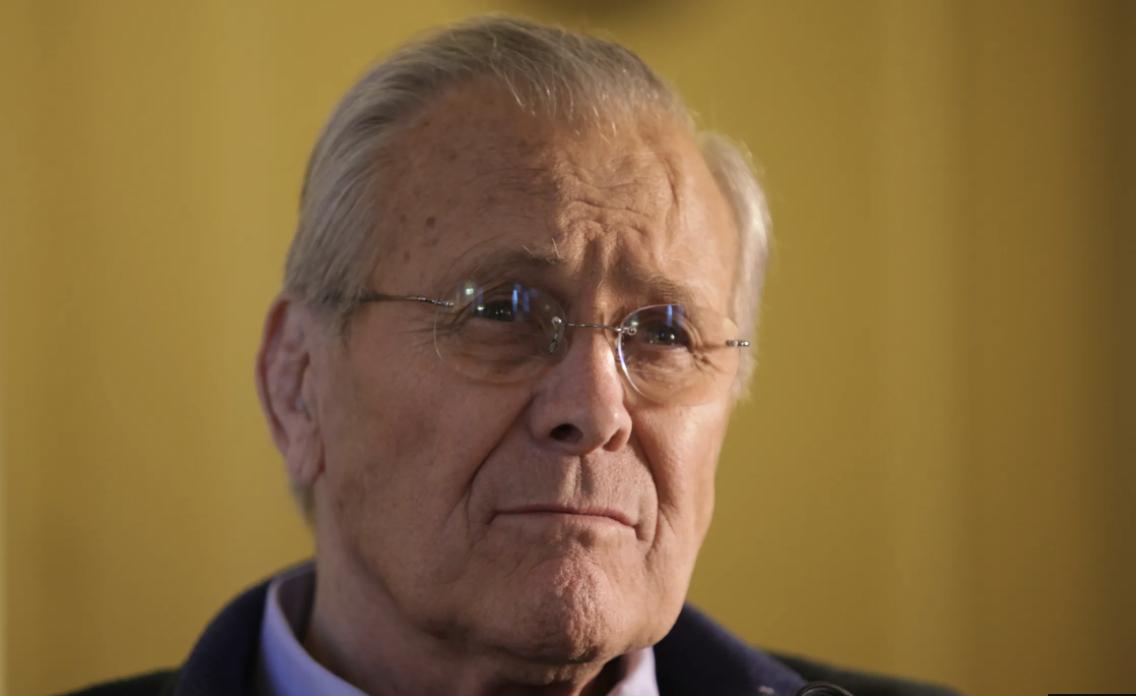When I read that Donald Rumsfeld died on June 29 at age 88 in Taos, N.M., I had mixed feelings about a complex man who had a home in St. Michaels and rode high during many years spent in the top echelons of government in the nation’s Capital.
During his career holding top jobs in Republican administrations over a period of 50 years, he employed a relentless work ethic, great intellect, driving ambition and a combative personality in serving as a member of Congress, a chief of staff to a president and twice as the Secretary of Defense. His achievements coincided with a personal style that earned him enemies, including members of Congress.
What intrigued me too was his bitter attitude toward an Ivy League education, aimed particularly at those whom he considered entitled and elitist. Ironically, he was a graduate of Princeton University, which he attended on an ROTC scholarship, and where he was on the wrestling team.
When he and his wife Joyce moved to St. Michaels, they mixed and mingled with many people, impressing them with their down-to earth manner. He left his reputed irascibility elsewhere.
Extremely successful in government and the corporate world, he sought results and considered the status quo an impediment that must be overcome. He confronted bureaucratic inertia with a vengeance.
Spending six years as Secretary of Defense under President George W. Bush, he left government service in late 2006 for the final time amid a barrage of unstinted criticism over his leadership during the Iraqi war and its aftermath. He came across as arrogant and dogmatic, perceived as failing to respond aggressively and strategically to the insurgencies that materialized after the toppling of Saddam Hussein.
He opposed a troop surge that many thought, rightly so, would stanch the mounting number of American deaths.
A lighting rod for unceasing criticism, Rumsfeld remained loyal to President Bush and Vice President Dick Cheney, shouldering public condemnation without sharing the blame with his bosses. As he well knew, Washington can be an awfully cruel place to serve as a public servant.
In the years leading up to his exit, he uttered unfortunate comments that seemed to discount the growing crescendo of complaints, publicly appearing dismissive of military deficiencies such as unhardened Humvees frequently destroyed by improvised explosive devices (IEDs). His acerbic manner created a host of detractors, to his detriment and eventual dismissal by President Bush.
Viewed as a whole body of work, Rumsfeld’s career was truly outstanding, marked by continually elevated positions of responsibility. He never shied away from difficult missions, such as overseeing the Department of Defense after the Sept. 11, 2001, attack on America by Al Qaeda. When the Pentagon was struck by one of the four hijacked aircraft, he helped evacuate DoD personnel to waiting ambulances.
Our government leaders are flawed, as is true of low and determined human beings, as it is of the high and mighty. Donald Rumsfeld responded magnificently, albeit imperfectly, during his demanding career at the epicenter of our federal government.
His judgment in owning a home in the Eastern Shore was impeccable. Many recall him fondly.
Columnist Howard Freedlander retired in 2011 as Deputy State Treasurer of the State of Maryland. Previously, he was the executive officer of the Maryland National Guard. He also served as community editor for Chesapeake Publishing, lastly at the Queen Anne’s Record-Observer. In retirement, Howard serves on the boards of several non-profits on the Eastern Shore, Annapolis and Philadelphia.



Write a Letter to the Editor on this Article
We encourage readers to offer their point of view on this article by submitting the following form. Editing is sometimes necessary and is done at the discretion of the editorial staff.